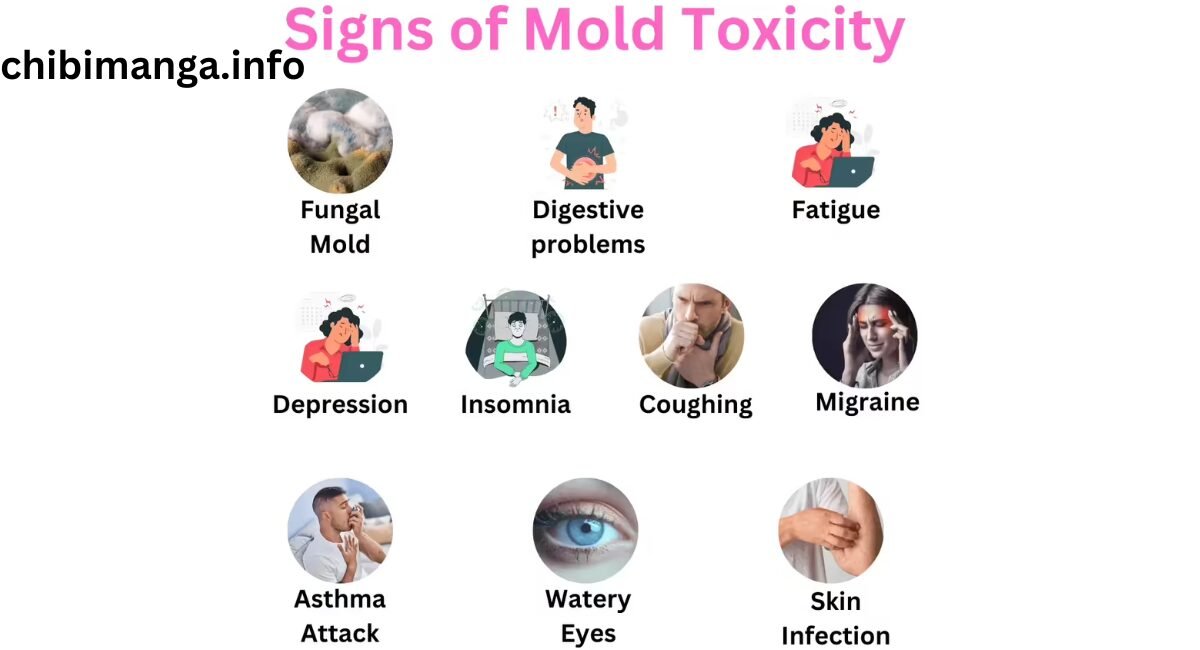Introduction
Mold is a common issue in homes and workplaces, often thriving in damp, dark, and poorly ventilated areas. While mold is an essential part of the natural environment, helping to break down dead organic matter, its presence indoors can pose serious health risks. Mold exposure can lead to a variety of health issues, including mold toxicity, which occurs when the body reacts to mold spores and mycotoxins. Recognizing the signs of mold toxicity is crucial for early intervention and treatment. This article highlights ten warning signs of mold toxicity that you should not ignore.
1. Respiratory Issues
One of the most immediate and noticeable effects of mold exposure is respiratory problems. Mold spores, when inhaled, can irritate the respiratory system and lead to a range of symptoms:
- Coughing: Persistent coughing, often dry, can be a response to mold spores in the air.
- Wheezing: A high-pitched whistling sound when breathing, indicating airway irritation.
- Shortness of Breath: Difficulty breathing, especially after physical activity or when in a mold-infested area.
- Chest Tightness: A feeling of pressure or tightness in the chest, often accompanied by discomfort or pain.
These symptoms can worsen when spending time in a mold-contaminated environment and may improve when away from the source. Chronic exposure can exacerbate existing respiratory conditions such as asthma or bronchitis.
2. Allergic Reactions
Mold exposure can trigger allergic reactions similar to those caused by pollen or dust mites. Common allergic symptoms include:
- Sneezing: Frequent sneezing, often in fits.
- Runny or Stuffy Nose: Persistent nasal congestion or a runny nose.
- Itchy Eyes: Red, itchy, and watery eyes.
- Congestion: Sinus congestion, leading to headaches and facial pain.
These allergic reactions can vary in severity and may be more pronounced in individuals with pre-existing allergies or sensitivities to mold.
3. Skin Irritations
Direct contact with mold or exposure to airborne mold spores can lead to skin irritations. Symptoms may include:
- Rashes: Red, inflamed patches of skin that may be itchy or painful.
- Itching: Persistent itching, which can be localized or widespread.
- Burning Sensations: A feeling of burning or stinging on the skin.
These symptoms can occur upon direct contact with moldy surfaces or through indirect exposure via airborne spores. They can be particularly troublesome for individuals with sensitive skin or existing dermatological conditions.
4. Cognitive and Neurological Symptoms
Mold toxins, or mycotoxins, can affect the nervous system, leading to a variety of cognitive and neurological symptoms. These can include:
- Brain Fog: A feeling of mental cloudiness or confusion, making it difficult to think clearly.
- Memory Problems: Difficulty remembering recent events or retaining new information.
- Headaches: Frequent or severe headaches, which can be debilitating.
- Difficulty Concentrating: Trouble focusing on tasks or maintaining attention.
- Dizziness and Vertigo: Sensations of spinning or dizziness, which can affect balance and coordination.
These symptoms can significantly impact daily life and productivity, often leading to frustration and stress.
5. Fatigue and Weakness
Persistent fatigue and a general feeling of weakness are common signs of mold toxicity. These symptoms include:
- Chronic Tiredness: Feeling tired all the time, even after a full night’s sleep.
- Lack of Energy: Difficulty finding the energy to perform daily activities.
- Physical Weakness: A general feeling of weakness in the muscles and body.
This fatigue can interfere with daily functioning and may lead to a decrease in overall quality of life.
6. Sinus Issues
Mold exposure can exacerbate chronic sinusitis or lead to frequent sinus infections. Symptoms of sinus issues include:
- Facial Pain: Pain or pressure in the forehead, cheeks, and around the eyes.
- Pressure: A feeling of fullness or pressure in the sinuses.
- Congestion: Persistent nasal congestion, which can lead to difficulty breathing.
Chronic sinus issues can be particularly bothersome and may require medical intervention if left untreated.
7. Muscle Aches and Joint Pain
Unexplained muscle aches and joint pain can be a sign of mold toxicity. These symptoms may include:
- General Aches: Persistent aches and pains throughout the body.
- Joint Pain: Pain in the joints, which can worsen with activity.
- Disrupted Sleep: Pain that interferes with sleep, leading to further fatigue.
These symptoms can be mistaken for other conditions, making it important to consider mold exposure as a potential cause.
8. Digestive Issues
Mold toxicity can affect the digestive system, leading to symptoms such as:
- Nausea: A feeling of sickness in the stomach.
- Vomiting: Episodes of vomiting, which can lead to dehydration.
- Diarrhea: Frequent, watery bowel movements.
- Abdominal Pain: Cramping or pain in the abdomen.
These digestive issues can be mistaken for food poisoning or other gastrointestinal problems, making it important to consider mold exposure as a possible cause.
9. Mood Swings and Depression
Mold exposure can impact mental health, leading to mood swings and depression-like symptoms. These can include:
- Irritability: Increased irritability and frustration.
- Anxiety: Feelings of anxiety or panic attacks.
- Depression: Persistent sadness, hopelessness, and a lack of interest in daily activities.
These mental health symptoms can be challenging to manage and may require professional intervention.
10. Sleep Disruptions
Mold toxicity can interfere with sleep patterns, leading to:
- Difficulty Falling Asleep: Trouble initiating sleep, even when tired.
- Frequent Awakenings: Waking up multiple times during the night.
- Restless Nights: Experiencing a general sense of restlessness and discomfort during sleep.
Poor sleep can exacerbate other symptoms of mold toxicity and lead to further health complications.
YOU MAY ALSO LIKE
Master Social Media Marketing With SMM Panels
Conclusion
Mold toxicity is a serious health concern that can manifest in various ways, affecting the respiratory system, skin, cognitive functions, and overall well-being. Recognizing the warning signs of mold toxicity is crucial for early intervention and treatment. If you suspect that you or someone in your home or workplace is experiencing mold toxicity, it is important to consult a healthcare professional for proper diagnosis and treatment.
Identifying and addressing the source of mold exposure is equally important. Professional mold remediation services can help eliminate mold from your environment, reducing the risk of health issues and improving the overall quality of life.
Disclaimer
This information is not a substitute for professional medical advice. Always consult a doctor for the diagnosis and treatment of mold toxicity. If you suspect mold exposure, seek professional assistance for mold remediation to ensure a safe and healthy living environment.










